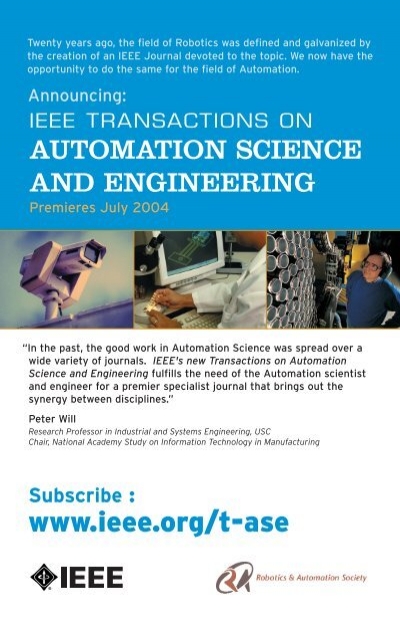基于Pareto最优的可重构机器人机械臂有限时间最优反推力/位置控制
IF 6.4
2区 计算机科学
Q1 AUTOMATION & CONTROL SYSTEMS
IEEE Transactions on Automation Science and Engineering
Pub Date : 2025-01-09
DOI:10.1109/TASE.2025.3527569
引用次数: 0
摘要
针对可重构机器人从自由空间运动过渡到环境接触任务时的力/位置控制难题,提出了一种基于自适应动态规划(ADP)的有限时间最优反步力/位置控制方法,在保证系统稳定性的同时,保证了外部约束下状态误差的快速收敛。通过集成鲁棒控制,提高了算法的收敛速度和对不确定性的鲁棒性。此外,采用基于Pareto最优的合作博弈论方法对鲁棒性相关参数进行优化。基于lyapunov的分析证明了闭环系统的半全局实用有限时间稳定性(SGPFS)。实验验证了所提控制方法的有效性。从业人员注意事项——在诸如空间操作、深海勘探和灾难救援等应用中,rrm必须顺利地从自由空间运动过渡到涉及与外部环境物理接触的任务。在这些条件下,传统的力/位置控制方法往往难以保持稳定性并实现快速收敛。本文介绍了一种将ADP与反演相结合的控制策略,以实现有限时间最优控制。该方法确保了稳定性、快速收敛性和对不确定性的鲁棒性,解决了能源效率和可靠的力/位置跟踪的实际需求。此外,该方法通过基于Pareto最优、平衡控制努力和收敛域大小的合作博弈论框架来优化控制参数。实验结果验证了该策略在复杂环境下的实际有效性。本文章由计算机程序翻译,如有差异,请以英文原文为准。
Adaptive Dynamic Programming-Based Finite-Time Optimal Backstepping Force/Position Control of Reconfigurable Robot Manipulators via Pareto Optimal
To address the force/position control challenges in transitioning from free-space motion to tasks involving environmental contact, this paper proposes an Adaptive Dynamic Programming (ADP)-based finite-time optimal backstepping force/position control method for Reconfigurable Robot Manipulators (RRMs), which ensures rapid convergence of state errors under external constraints while maintaining system stability. By integrating robust control, the proposed method enhances both convergence speed and robustness against uncertainties. Furthermore, the parameters related to robustness are optimized using a cooperative game-theoretic approach based on Pareto optimality. A Lyapunov-based analysis demonstrates the closed-loop system’s Semi-Global Practical Finite-time Stability (SGPFS). Experimental validation confirms the effectiveness of the proposed control method. Note to Practitioners—In applications such as space operations, deep-sea exploration, and disaster rescue, RRMs must smoothly transition from free-space movement to tasks involving physical contact with external environments. Traditional force/position control methods often struggle to maintain stability and achieve rapid convergence under these conditions. This paper introduces a control strategy that combines ADP with backstepping to achieve finite-time optimal control. The proposed approach ensures stability, fast convergence, and robustness to uncertainties, addressing practical needs for energy efficiency and reliable force/position tracking. Moreover, the method optimizes control parameters through a cooperative game-theoretic framework based on Pareto optimality, balancing control effort and the convergence domain size. Experimental results confirm the practical effectiveness of the proposed strategy in complex environments.
求助全文
通过发布文献求助,成功后即可免费获取论文全文。
去求助
来源期刊

IEEE Transactions on Automation Science and Engineering
工程技术-自动化与控制系统
CiteScore
12.50
自引率
14.30%
发文量
404
审稿时长
3.0 months
期刊介绍:
The IEEE Transactions on Automation Science and Engineering (T-ASE) publishes fundamental papers on Automation, emphasizing scientific results that advance efficiency, quality, productivity, and reliability. T-ASE encourages interdisciplinary approaches from computer science, control systems, electrical engineering, mathematics, mechanical engineering, operations research, and other fields. T-ASE welcomes results relevant to industries such as agriculture, biotechnology, healthcare, home automation, maintenance, manufacturing, pharmaceuticals, retail, security, service, supply chains, and transportation. T-ASE addresses a research community willing to integrate knowledge across disciplines and industries. For this purpose, each paper includes a Note to Practitioners that summarizes how its results can be applied or how they might be extended to apply in practice.
 求助内容:
求助内容: 应助结果提醒方式:
应助结果提醒方式:


